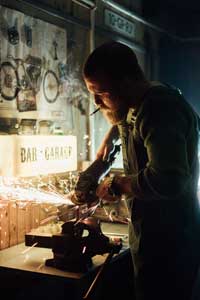Macam Mana Nak Cari Jodoh di Malaysia?

900k ahli di sana sedang mengunggu anda di Baitul Jannah. Mungkin.. jodoh awak ada sana.
Daftar Sekarang!
The Madman
- 4
- freddychan
- 13 years ago
- 5,495
- FREE
The roads are covered with fogs spewed out by the cars passing by. I’m a stranger of the busy village, sipping coffee in a foggy morning, watching the lives pass by in the new environment. I am Bryan Liu, and I’m a journalist.
The sounds of people chowing down on their food decorated the sounds of chattering outside the kopitiam. The ceiling fan above me seemed rusted and were about to fall off from its wire and into my coffee cup. A Chinese old man were sitting beside my table, leaving his ‘chee cheong fun’ untouched while he switches through the pages of yesterday’s newspaper. A mother was seen stuffing food into her child’s mouth, while the child played with his Ultraman figure. Nostalgic Chinese songs drifted across my ears to make me reminisce about the Japanese Invasion in Malaya. From where I came, this is such a pleasant view. No Starbucks. No sophisticated looks on the citizens. Everyone is living as humble as an unpolished car.
I was sent here to write about the life in the Krau Village. The life of the citizens and their culture. I did not find this assignment entertaining; I’ve been to better places. Interviewing a prostitute in the Red Light District of the Klang Road, talking to a 15-year old mother who had dumped her baby in the laundry machine. I’ve been to better places.
The whole kopitiam were silenced. A man in his 80’s wearing pagoda shirt entered the restaurant, holding a Dunhill cigarette. The customers carried on doing what they were doing seconds ago. I observed the man’s every movement, from the way he took a cup and poured his own coffee without even bothering the waiter. He gently took the lighter from a stranger and lit up his cigarette.
He sat down on his chair and began putting his cigarette on his lips. He didn’t even inhale the smoke. He puffed it out straight away. He stared through the wall for a very long time, before holding up the cup and drank from it. While he was drinking, his eyes haven’t moved an inch from the wall. And there I was, spending my work hours staring on some potentially crazy fellow.
A Chinese old man went over to my table and sat beside me. He whispered to me, “Stop staring at the guy.”
“Is he dangerous?” I answered, shocked at the close distance between my face and the Chinese man. He sat back and put down his glasses.
“You must be new here.” He said, rubbing his coffee cup with his thumb. “Otherwise you wouldn’t be amazed by the man’s actions.”
I nodded in agreement, eager to know more about the madman. I noticed tear coming out of the madman’s eyes. He was still staring at the wall.
“His name is Wai Seng. He became that way for a reason.” The man said, leaning close to me as if he was telling a gossip. “He had his golden years.”
***
Chan Wai Seng had been around during the age of Japanese occupation in Malaysia. He worked as a farmer, prompted to hide in his huts when the Japanese strolls around his house. Apparently, he survived the age, not to be killed off by those kempeitais. For him, life was simple and it deserved to be lived this way. He sold off his fruits of labour every end of the month to trade for rice and meat. He had fond memories with the girl next door. He would hide with her whenever the Japanese raids the village. They looked after each other. They would die for each other. In the face of violence and war, love always prevails.
The bombing in Hiroshima and Nagasaki marked the historical day where the Japanese surrendered, handing in their katanas to the British in Malaya. Wai Seng took her out for a first date. Why the first date, you may ask. Wai Seng would answer, “Today is the new day, the new beginning for the both of us.”
They sat together in the bench one night, looking at the overcast cloud over his orchard. Wai Seng looked at the girl, knelt down, and presented the girl a basket of fruits harvested from his orchard. That basket was a month salary of his. He proposed to her, promised to live with her through thick or thin. Through days of fortune and ills alike. She agreed. And they were man and wife that night.
It wasn’t long before the Communists took reign of the country. Everyone was suspicious with each other, fearing that they might be another participant for the Min Yuen operation. Bukit Kepong was under siege. Bodies found almost every night in the jungle. Malaya was once again in crisis but their lives remained unchanged.
It was one day when Wai Seng was harvesting in an orchard before a group of communists invaded his property and seized him. He was restrained on a chair and the communists demanded some supply from his orchard. Wai Seng knew that if he was to hand them some supplies, he would be a traitor. He would be a fugitive in his own country, and he would be hunted down by communists sooner or later. He bought himself some time. He took the pocket knife he hid on his back. He knew this day would come. Few cuts on the rope set him loose. The communists underestimated him. They were all unarmed.
With a pocket knife, come 8 bodies. Throats were slit, their eyes were bulging. And soon the good news spread. Wai Seng was celebrated as Krau Village’s new heir. His wife shares the good news, without expectation that Wai Seng might stood a chance to be in that position.
Wai Seng kept an eye on every supply put in or out by the villagers. He made sure there were no excess coming in and no less coming out. He kept track of every farmer’s move in his little triple 5 book. Rice and organics were distributed, just enough for villagers not to die of starvation. If there would be someone getting fatter week by week, it must because they ate tree barks for supper. Fighting the Communists was no easy task. Few gave up and joined the Communists only to be tied up like a stuck pig next week. Wai Seng was in power. He was in charge of keeping the godless infestation out of Malaya.
A king by day, a husband by night. He never fails to come home in time for dinner. His wife patiently waited for him. She would ask how much longer would Malaya suffer, and he said the time is as imminent as the break of dawn. She always find that reassuring.
The time had indeed come. Like the break of dawn. The scourge infecting Malaya was purged to its core. If it weren’t for Wai Seng’s courage to stand up against the enemies that fateful day in the orchard, God knows what will happen to Krau Village. God knows what will happen to Malaya.
But good news always come in two-fold, Wai Seng’s wife was pregnant. The whole village now had one more reason to celebrate.
His daughter grew up for 12 wonderful years in a loving family. Wai Seng had a prosperous life, but he chose to give it away. Poverty rate in Krau Village decreased by 8 %, and his contributions were obvious. He was visited by the Sultan and was handed a certificate of contribution. As you were told earlier, he had his golden years.
Looking ahead at another 10 years after the Independence Day of Malaya, his daughter got an offer for a doctorate in the United Kingdom. Wai Seng and his wife could not be happier. They sent her off with much affection. They probably won’t be seeing her for another 7 or 8 years, as his daughter proclaimed, “Working outside the country brings in more payroll”.
Wai Seng’s hair grew whiter day by day, his daughter wrote home lesser as the year progresses. His wife became sick day by day, mostly out of the lost affection of her daughter overseas. He wrote to her daughter about the incident of May 13th; he told her not to worry about her parents’ safety. In his heart, he doubted if the letter ever reached her at all.
In the midst of the 70’s era, he got news that his daughter came home finally. Out of excitement, his wife tortured herself to clean up her daughter’s room to welcome her home again. Weeks passed by as no one set foot into their house. Wai Seng’s wife was bedridden for days, determined to stay alive until her daughter come back home. Wai Seng notified the village to look for his daughter and to tell him as soon as they know his daughter’s whereabouts.
A relative of his neighbour finally came with a news, saying that his daughter was somewhere in Kuala Lumpur. He bumped into her a week ago with a mat salleh.
Without knowing more of that matter, Wai Seng set out to Kuala Lumpur with few ringgits in his hands. Rumour or not, the risk must be taken. Before stepping out the door, Wai Seng kissed his wife on the forehead and promised that their daughter’s return will be imminent. Just like the break of dawn. His wife forced a bitter smile, hoping she could stay long enough until her daughter comes home.
He travelled all the way to Kuala Lumpur, switching train stations, sleeping on the streets. He endured nights of back pain just to reach Kuala Lumpur. He looked at the empty streets under the night sky. Now that he’d reached his destination, he wondered how he would find his daughter.
He stayed on the streets with hope of a tiny glimpse of seeing her daughter. It took him three bitter days to find his daughter in the big city. He confronted her the moment he saw her. He was in the midst of collapsing.
His daughter looked down on him as he knelt in front of her, telling her that he was her father. Forgiveness was given before it was even asked for. His daughter had no desire for forgiveness. The girl he had nourished with love and affection half of his living years had turned her back on him. She is now the upper class of society, stripped bare of kinship or relativity with her lower-class family. Before turning away, her husband looked at Wai Seng as if he was the filth of the earth.
His daughter took a large pile of money and stuffed it into Wai Seng’s breast pocket. She crouched to bring herself on the same level as Wai Seng. She whispered to her father, “Thank you for everything, father.”
This is not how a daughter repays the kindness of her parents.
Wai Seng cried out all his tears on that very ground. His daughter was gone in the crowd of the busy street. He brought himself up and called her wife to tell her about it. About the death of someone they hold dear very much. For their daughter are no longer with them. Wai Seng’s wife gave a small sigh. For Wai Seng, it was the end of her.
He walked himself back to the station, clutching the final gift from his daughter– the money. After all he’d been through; all he got was just a trip back home.
Tragedy too comes in two-fold.
Upon arriving at Krau, he saw smoke coming out of his house. The villagers stopped him from entering the house, and told him that it was his own wife that set it on fire. She committed suicide. The flames were believed to start from his daughter’s bedroom. She would not live through the thick of the flames.
Wai Seng collapsed on the ground, laughing hysterically as he reminisce everything he had gone through in life. He tried to walk into the burning house to join his wife. What else is there to live for?
One of the villagers pulled him back as Wai Seng punched him, sending him to the floor.
“If anyone would let me live for today, tomorrow I will set all the houses on fire!” Wai Seng shouted, threatening the whole village. The police took over, and they restrained him.
Wai Seng was put under a mental rehabilitation centre in the Raub area. He requested to come back to Krau once in a while, under supervision of the officers. He wanted to see what others had built on the ground where his life fell apart.
***
I finished my cold coffee as I closed my notebook. The man who told me the story looked at Wai Seng. He turned his gaze to me.
“Son, now you know. Behind every madman, there’s always a reason stronger than the sane.” The man concluded his story, putting aside his empty plates to let the waitress pick it up. “In their years, they’ve contributed so much to the world that they sacrificed their own sanity in the process.”
“That’s an intriguing story.” I said.
“Yes, it is. You should put it in your journal and don’t forget to write an article about him.” The man said, searching for something in his bag. “Well, if you’ll excuse me, I must go to work now.”
He cast a uniform over his white shirt. The badge on the uniform read: “Facilitator”. On the other side, a few Malay words were etched onto it.
“Pusat Pemulihan Mental Raub”.
He stood up and went over to Wai Seng. He tapped the madman’s shoulder.
“Ah Seng, it’s time to go now.”
He was holding Wai Seng’s right arm as he walked out of the kopitiam. He seems to be talking to Wai Seng in a joyful tone.
After a while, before disappearing into the crowded streets, Wai Seng turned his head to me. He was happy again.
Related Stories
All Autobiography storiesOther stories
Conversations
Conversation
-
1) You really know how to write touching stories and this time it isn't a completely heart-breaking story hehe. The ending is just as sweet as the beginning
- Danny_Boy
- 13 years ago
-
2) yup, having a little change in style. haha
- freddychan
- 13 years ago
-
3) I almost cried in the office. A nice Tanggang tale, but from the perspective of the parent.

- Ancalime
- 13 years ago
-
4) hehe yeah, and also... the child goes unpunished. =/
- freddychan
- 13 years ago
-
5) Ouh dear, this is too sad. And i would love to know whatnhappened to the dsughter.
- uculer
- 13 years ago








